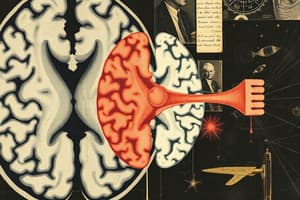Podcast
Questions and Answers
What type of therapy can help patients regain strength and mobility after a stroke?
What type of therapy can help patients regain strength and mobility after a stroke?
- Mental therapy
- Behavioral therapy
- Physical therapy (correct)
- Emotional therapy
Which of the following is NOT a preventable risk factor for strokes?
Which of the following is NOT a preventable risk factor for strokes?
- High cholesterol levels
- Genetics (correct)
- Diabetes
- Obstructive sleep apnea
What is a common preventive measure for cerebrovascular accidents?
What is a common preventive measure for cerebrovascular accidents?
- Stressful lifestyle
- Sedentary behavior
- Regular exercise (correct)
- Frequent caffeine intake
Which therapy can help stroke patients improve their communication skills?
Which therapy can help stroke patients improve their communication skills?
What should you do if you suspect someone is experiencing a stroke?
What should you do if you suspect someone is experiencing a stroke?
Which procedure is commonly used to remove a blockage in an ischemic stroke?
Which procedure is commonly used to remove a blockage in an ischemic stroke?
What is the primary goal in treating an ischemic stroke?
What is the primary goal in treating an ischemic stroke?
Which of the following is NOT a symptom of a cerebrovascular accident?
Which of the following is NOT a symptom of a cerebrovascular accident?
After experiencing a stroke, which symptom might require rehabilitation for improving motor skills?
After experiencing a stroke, which symptom might require rehabilitation for improving motor skills?
What type of stroke involves controlling bleeding and reducing pressure in the brain?
What type of stroke involves controlling bleeding and reducing pressure in the brain?
What is a key factor in preventing cerebrovascular accidents?
What is a key factor in preventing cerebrovascular accidents?
Flashcards are hidden until you start studying
Study Notes
Cerebrovascular Accident
A cerebrovascular accident (CVA), commonly known as a stroke, is a medical emergency that occurs when blood flow to a part of the brain is disrupted. Strokes can lead to a variety of symptoms, such as difficulty walking, dizziness, loss of balance and coordination, difficulty speaking or understanding others, numbness or paralysis in the face, leg, or arm, blurred or darkened vision, and a sudden headache.
Treatment of Cerebrovascular Accidents
The treatment for stroke depends on the type of stroke. For an ischemic stroke, the goal is to restore blood flow as quickly as possible, often by dissolving the clot with medication or removing the blockage with a catheter procedure. For a hemorrhagic stroke, the goal is to control bleeding and reduce pressure in the brain, which may involve medication to lower blood pressure or prevent blood vessel spasms, or surgery to remove clots or repair a ruptured blood vessel.
Symptoms of Cerebrovascular Accidents
Stroke symptoms can appear suddenly and may include difficulty walking, dizziness, loss of balance and coordination, difficulty speaking or understanding others, numbness or paralysis in the face, leg, or arm, blurred or darkened vision, and a sudden severe headache.
Rehabilitation After Cerebrovascular Accidents
Rehabilitation after a stroke often includes physical therapy, occupational therapy, and speech therapy, which can help patients regain strength and mobility, improve communication skills, and learn strategies for managing daily life tasks.
Prevention of Cerebrovascular Accidents
Many strokes are preventable by managing risk factors, such as high blood pressure, high cholesterol levels, cigarette smoking, diabetes, obstructive sleep apnea, lack of regular exercise, obesity, heavy alcohol use, recreational drug use, and some types of heart disease.
Conclusion
Cerebrovascular accidents can have a significant impact on a person's life, but early treatment and preventive measures can improve outcomes. If you suspect you or someone else is experiencing a stroke, seek emergency medical attention immediately.
Studying That Suits You
Use AI to generate personalized quizzes and flashcards to suit your learning preferences.




